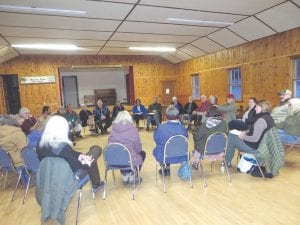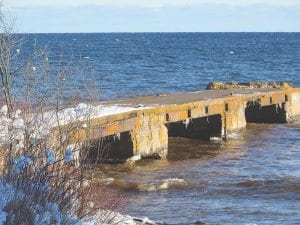A nice turnout of people attended a two-hour meeting on Friday, March 18 at the Hovland town hall to discuss a variety of subjects. Would a group of people work to gather information and pictures in an effort to chronicle the east end? And should the Hovland Community Club be re-established? The next meeting will be April 15 at 6 p.m. Left: One question considered was should work continue to save and restore the Hovland Dock?

Hovland and Colvill are rich in history. History that needs to be documented and preserved, but who should undertake this task?
That was the central theme of the Friday, March 18, 2016 town hall meeting attended by about 27 people.
Long before the first white man arrived by boat, native people traversed the land and waterways in search of food and furs. The indigenous people left trails and a rich history of stories and knowledge passed down to the first European settlers. In the 1880s, even before Hovland became the first township in Cook County, the first tourists came from Chicago to ply the lakes and streams for tasty trout and walleye. In 1905 the dock at Chicago Bay was built, and although now in great disrepair, remains the last vestige of its kind on the North Shore.
Colvill, of course was named for famed Colonel William Colvill who led his First Minnesota Volunteer Infantry in a famous charge at Gettysburg that helped the North win the Civil War.
Today Hovland and Colvill are quiet places with little hustle or bustle, and that’s how a lot of folks living there want to keep it. However, they also don’t want to lose their link to the past, so on Friday evening residents gathered at the Hovland Town Hall to discuss the area’s historical assets and to begin planning for their preservation and, in some cases, possible access to the public.
County Commissioner Frank Moe, who represents the Colvill and Hovland communities and Cook County Historical Society Director Carrie McHugh, both residents of the area, called the meeting, but Mary Petz moderated.
Petz asked residents to come up with a list of historical places and talk briefly about each. She led a discussion and review of Hovland and Colvill organizations, with much discussion centered on the Hovland Community Club, which was disbanded in the 1990s. Mary’s husband, Ben Petz, was at one time in charge of the club. He said that responsibility eventually fell to former east end County Commissioner Jan Hall.
“Jan did a wonderful job, but what happened was, whoever was in charge of the club ended up doing all of the work, which wasn’t right. So it eventually ended, but it was a good club,” Ben Petz said.
Commissioner Moe said the club still had $1,400 in a county account, “that’s been sitting there since the 1990s.”
A discussion followed and there was some interest in reviving the social club, but this time around those who join in the activities would have to agree to share in the work.
A discussion was held about the work that needed to be done on the town hall and the playground/picnic area that will be built on the grounds. Moe said Patty and Dan Meyer are the current caretakers of the facility, and he lauded their work. But, said Moe, while the county-owned building had received some much needed work, there was still a lot to do. He said the plan was to have the building up to speed by the 4th of July, “in time for the Hovland Arts Festival.”
Someone asked how old the building was and Arvis Thompson replied that both the Colvill and Hovland town halls were built in 1936. Pat Zankman said that Charlie Johnson (the Charlie Johnson who lived at the bottom of the Moose Valley Road) had built the Hovland Town Hall and maybe the Colvill Town Hall as well, but she wasn’t sure about that.
Virginia Danfelt suggested getting historical information and material about the area’s trails posted in a kiosk that could be located at the Hovland Town Hall. Moe said that might be a possibility, but added that the town hall parking lot is owned by neighboring Trinity Lutheran Church, which surprised many people in the room.
To chronicle the past more efficiently, Roger Linehan suggested gathering historical pictures that contained little or no information on the backs of them and call for a community meeting where longtime residents might be able to identify people and places depicted. “They have done this in Grand Portage and it has worked very well,” he said.
McHugh gave an update on the crumbling Hovland Dock, which has seen several attempts to save it with little luck. Harry Drabik said that with the latest attempt to have the dock put on the National Register of Historic Places (NHRP) rejected because a cement cap had been put on the structure, it was time to give up on the project. Several others in the audience echoed Drabik’s comment, but McHugh said after conducting more research, she believes the dock may still qualify as a NHRP site, and she is going to keep the process going if there is community support for it.
When Commissioner Moe asked who was interested in getting lists, locations, and histories of walking trails, sites of old schools, post offices, businesses, CCC Camp locations etc., no one raised their hand.
Next he asked who would be interested in helping with the Hovland Arts Festival, and only a couple hands went up. Appearing frustrated, Moe told everyone who wasn’t interested in helping with the Hovland Arts event to go home, which prompted Ivy Hocking to respond, “Hold it. Why can’t the whole group meet again? I don’t want to send people out the door who were interested enough to attend this meeting. We are all interested in doing something, we just need to formulate a process and work through these ideas.”
Most people agreed with Hocking, and Moe relented, saying he had put together the agenda as a way to begin discussion that would lead, hopefully, to action.
Ben Petz suggested narrowing the agenda to a few items, which many people also agreed was a good idea, and another person suggested they all bring their supper to the next meeting. While no firm date was set for the next session, three agenda items mentioned included more discussion on trails, starting the community club again and working to chronicle records of people and places of the area before they are gone and lost to time.



Loading Comments